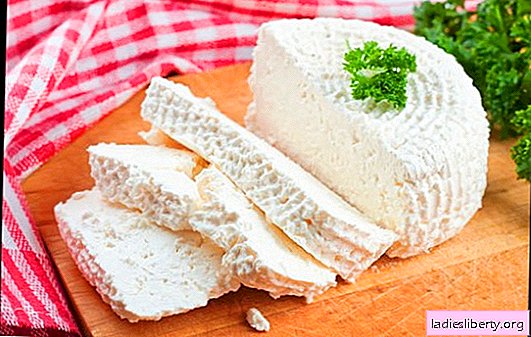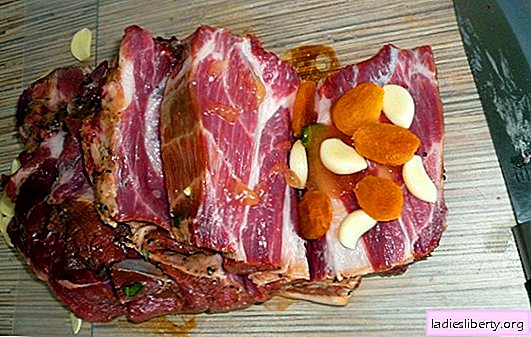
Adygea cheese is one of the pearls of the world cheese variety, the high taste and healthy qualities of which deserve special attention. It is reliably known that the addition of cheeses of this type in the weekly diet comprehensively strengthens the body and helps get rid of many diseases.
Characteristic features of Adyghe cheese and its benefits in general
This cheese from the Circassian cuisine belongs to the category of pickled cheeses and can be approximately compared with mozzarella, suluguni and feta cheese, but still Adyghe cheese is completely special.
The main ingredients of the cheese are cow or goat milk, sourdough and salt.
Adyghe cheese is moderately dense, slightly layered, crumbles heavily when sliced. Entirely (it has no crust) has a white or yellowish-milky color. Taste - characteristic sour-milk cheese, moderately brackish with a pleasant smell.
The manufacturing technology of Adyghe cheese has a number of features:
· First, milk is pasteurized at a temperature of 95 degrees, which, by the way, is not only necessary to create the product itself as it is, but also allows you to destroy the bacteria that cause a dangerous infectious disease - listeriosis;
· Further fermented milk sourdough (whey) is introduced into milk, during the reaction with which clots form in milk;
· They are collected for the formation of future cheese, placed in a special container that forms raw heads. Once cheese ripened in baskets of willow twigs, due to which a characteristic pattern forms on its surface, today the technology has changed, but the relief is still often adorned with this cheese;
· At the end of manufacture, the cheese is coated with salt (saline) to better preserve its taste and healthy qualities.
Cheese heads are usually formed in a small, cylindrical shape.
The most popular fresh Adyghe cheese without additives, but you can also find its variations with the addition of herbs, vegetables and dried fruits.
Even Adyghe cheese can be smoked.
The energy value of the variety is 264 kcal per 100 g of product, which is approximately 90 kcal less than the similar characteristic of many hard (Dutch, Gouda, Poshekhonsky) varieties.
The ratio of BJU per 100 g of Adyghe cheese is expressed as follows:
Proteins 19.2 g;
· Fats 14-20.8 g (depending on the fat content of milk);
Carbohydrates 1.5 g
It is brine cheeses that are known among other fermented milk products as a source of easily digestible protein (it breaks down faster and easier than that found in beef and chicken), which serves as a material for the body to renew cells and build muscle.
Naturally, in Adyghe cheese, as in a fermented milk product, calcium is found in excess, providing:
· Bone strength and speed, quality of their splicing in case of fractures;
· Excellent condition of nails;
· Strength and elasticity of blood vessels;
· Beauty and health of hair.
But calcium only opens the list of elements that are rich in Adyghe cheese and here is what is useful to know about some of them:
· B vitamins are necessary for thyroid health, anemia prevention, energy production, good appetite;
· Phosphorus, paired with calcium, forms bone tissue, is needed for kidney function and transmission of nerve impulses;
· Sodium is required for normal water-salt balance and the production of gastric juice;
· Vitamin A preserves eye health, promotes wound healing, gives elasticity and smoothness to the skin.
In cooking, Adyghe cheese is used in the usual ways for cheeses - of course, it is eaten separately, prepared with sandwiches and salads, pies and casseroles, added to pasta and even porridge. It combines perfectly with all products.
Natural Adyghe cheese has a shelf life of about a month and goes on sale in vacuum packaging, after opening which it can be consumed for 7-10 days.
Adyghe cheese is stored only at low temperatures (in refrigerators), open - separately from products with a sharp, strong aroma that cheese can take over.
To protect against them (and maintain a fresh taste), it is recommended to transfer the cheese extracted from the packaging into glass containers with a tight-fitting lid.
But you should not freeze this variety - it will lose a lot of taste and healthy qualities.
Smoked cheese is stored for longer and in less severe conditions.
What Adyghe cheese will benefit in the weekly diet
According to nutritionists, for Adyghe cheese to bring tangible benefits, they should be treated several times a week, without cutting less than 100 g into a daily serving of cheese.
Thanks to natural enzymes, the variety positively affects the microflora of the gastrointestinal tract and supports healthy digestion, accelerates the elimination of accumulated toxins and toxic substances.
Gradually, the cheese establishes all metabolic processes in the body, normalizes the production of various enzymes and strengthens the natural defenses of a person against adverse environmental factors, whether it be a polluted atmosphere, magnetic storms or the harmful side of the ultraviolet radiation of the sun.
Also, the regular use of Adyghe cheese contributes to:
· Prevention of vitamin deficiency;
· Strengthening tooth enamel;
· Stabilization of blood pressure (from elevated to normal).
How else are the benefits of Adyghe cheese manifested
Adygea cheese is recommended to be included in the menu for rehabilitation after serious illnesses (including infectious ones) and surgical operations; it restores strength and energizes well under heavy physical exertion (for which athletes love it).
Nutritionists insist that this cheese even has antidepressant properties, improves mood and improves performance.
A little Adyghe should be enjoyed by pregnant women - its sourish, salty taste will help get rid of nausea, and the already mentioned protein-vitamin composition will provide both the mother and the child with the most necessary nutrients.
And during lactation, this variety increases the quality and volume of milk produced.
Could there be harm from Adyghe cheese
It is hardly possible to attribute Adyghe cheese to junk food - if there is no allergy to dairy products - almost certainly adding it to the diet will result in many positive changes in the state of the body and in well-being.
True, in order to avoid harm from Adyghe cheese, which manifests itself in the form of worsening conditions, nutritionists insist on restricting its use in gastritis, colitis and urolithiasis.
But, even if there are no such diagnoses, overeating Adyghe cheese is not recommended. The fact is that the accumulation in the human body of the amino acid tryptophan contained in excess in this variety can cause severe headaches.
Returning to the topic of allergies, it is worth noting that in the production of cheese (as well as cottage cheese, sour cream, kefir and other dairy products), as a result of ripening, the properties of milk protein significantly change for the better (for people who cannot tolerate it), so there is very little chance manifestations of the Adyghe cheese harm in the form of an allergic reaction.











